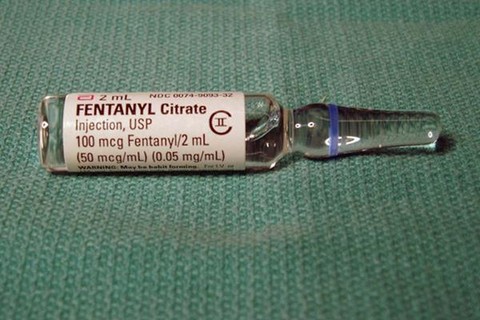 Society
Society


|
| A fentanyl dose for medical use. — Photo congan.com.vn |
HÀ NỘI — The police are warning about the imminent arrival of fentanyl in Việt Nam, a synthetic opioid 50 times stronger than heroin and 100 times more powerful than morphine.
Lieutenant General Nguyễn Văn Viện, Director of the Drug Crime Investigation Department (C04) under the Ministry of Public Safety, highlighted the dangers of this drug, citing its role in the surge of overdose deaths in the US.
He said fentanyl is smuggled into the US mainly from Mexico and Central and South American countries. The main precursors used to produce the substance are NPP (N-Phenethy-4-Piperidone) and 4-ANPP (4-Anilino-N-Phenethylpiperidine).
The ease of absorption is alarming, just 0.2 mg, a minuscule amount comparable to a pencil tip dot, can cause shock and death if absorbed through the skin. Because of the toxicity, fentanyl and some of its derivatives have been included in Schedule I - List of Substances under Control under the 1961 United Nations Convention.
"A video shared by the US authorities depicting a DEA (Drug Enforcement Administration officer accidentally exposed to fentanyl and succumbing rapidly underscores this danger," said Viện.
In Southeast Asia, fentanyl has been detected and seized in Myanmar, Laos, and Thailand, where authorities intercepted more than 510 tonnes of Aniline, which can be used to produce 85 tonnes of fentanyl.
Additionally, China, a major source of precursor chemicals used in fentanyl production, also raises concerns about potential local manufacturing.
Despite the current lack of fentanyl being detected in Việt Nam, the police are taking proactive measures. C04 has collaborated with various agencies to strengthen border controls, monitor precursor chemicals and raise public awareness.
At the press conference on Tuesday, Viện said there will be a big push to educate teenagers, students and the general population, emphasising the dangers of fentanyl and other new, emerging drugs.
"If a drug-related death occurs in Việt Nam and it is caused by fentanyl, the police must trace the origin of the drug to find out where and from whom it was purchased. They must find the source at all costs, because this substance must have been brought in from abroad," said Viện.
The medical use of fentanyl is strictly controlled. Hospitals use it as a powerful pain reliever, typically administered through injections, patches or nasal sprays.
However, illegally produced fentanyl often takes the form of pills, powders, or solutions, sometimes mixed with heroin, cocaine or even disguised as more common drugs. This lack of control over dosage and purity significantly increases the risk of overdose and death.
Fentanyl's classification under Group II of Việt Nam's narcotics regulations allows limited use for medical and research purposes, but only under strict supervision. Derivatives like Alfentanil, Butyrfentanyl and Remifentanil are also tightly controlled.
By tightening regulations, raising awareness and fostering international cooperation, the police hope to mitigate the potential devastation this drug could cause.
The International Narcotics Control Board has identified more than 150 fentanyl-related substances that have no medical applications. The United Nations Office on Drugs and Crime also estimates that laboratories may have synthesised hundreds of fentanyl-like substances.— VNS




